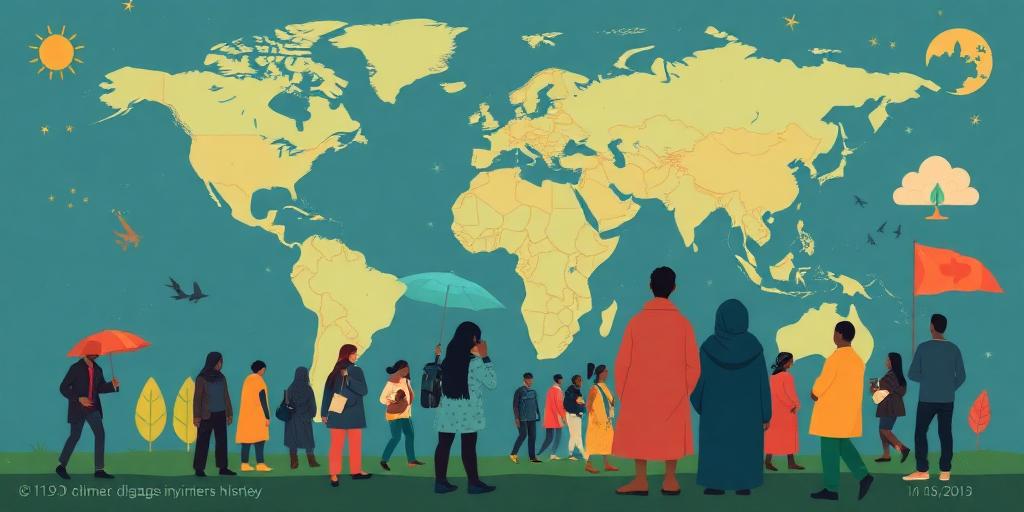The Impact of Climate Migration on International Relations
Climate migration, the movement of people due to climate change impacts, is increasingly recognized as a significant factor in international relations. This phenomenon is not merely a humanitarian issue; it has profound implications for national security, resource management, and diplomatic strategies.
Understanding Climate Migration
Climate migration refers to the displacement of individuals or communities primarily due to the adverse effects of climate change. These effects include:
- Sea-Level Rise: Coastal communities face displacement as rising sea levels inundate their homes and agricultural lands.
- Extreme Weather Events: More frequent and intense hurricanes, floods, and droughts force people to move in search of safety and resources.
- Desertification and Land Degradation: Changes in precipitation patterns and land degradation make agriculture unsustainable, leading to migration from rural areas.
- Resource Scarcity: Climate change exacerbates water and food scarcity, leading to conflicts and migration.
Impacts on International Relations
Increased Border Pressures: Climate migrants often seek refuge in neighboring countries, leading to increased pressure on border control and immigration systems. This can strain relations between countries, especially when resources are limited or when host countries are already dealing with their own climate-related challenges.
National Security Concerns: Mass migration can destabilize regions, creating security concerns for both the countries of origin and destination. The influx of migrants can exacerbate existing social, economic, and political tensions, potentially leading to conflicts.
Resource Competition: Climate migration can intensify competition for resources such as water, land, and energy. This can lead to disputes between communities and even countries, further destabilizing international relations.
Humanitarian Crises: Large-scale displacement due to climate change can overwhelm humanitarian response capacities. International organizations and individual countries may struggle to provide adequate assistance, leading to further suffering and potential political instability.
Legal and Ethical Dilemmas: There is currently no international legal framework specifically addressing climate migrants. This gap creates legal and ethical dilemmas regarding the rights and protections afforded to these individuals. Countries often struggle to determine whether to grant asylum, provide temporary protection, or return migrants to their countries of origin.
Case Studies
- The Sahel Region: In the Sahel, desertification and drought have led to significant migration flows. This has contributed to conflicts over scarce resources and increased instability in the region.
- Bangladesh: As a low-lying country, Bangladesh is highly vulnerable to sea-level rise and extreme weather events. Millions of people are at risk of displacement, which could strain relations with neighboring India.
- Pacific Island Nations: Several Pacific Island nations face the existential threat of rising sea levels. The potential displacement of entire populations raises complex questions about sovereignty and international responsibility.
Policy Recommendations
Addressing the challenges posed by climate migration requires a multifaceted approach:
- Mitigation Efforts: Reducing greenhouse gas emissions is crucial to slowing down the pace of climate change and reducing the drivers of migration.
- Adaptation Measures: Investing in adaptation measures, such as drought-resistant crops and improved water management, can help communities stay in their homes.
- International Cooperation: Strengthening international cooperation on climate migration is essential. This includes developing legal frameworks, providing financial and technical assistance to vulnerable countries, and coordinating humanitarian responses.
- Planned Relocation: In some cases, planned relocation may be necessary. This should be done in a way that respects the rights and dignity of the people involved.
- Conflict Resolution: Addressing the root causes of conflict and promoting peaceful resolution mechanisms can help prevent migration from leading to violence.
Conclusion
Climate migration is a growing challenge that has significant implications for international relations. By understanding the drivers and impacts of climate migration, and by implementing effective policies and strategies, the international community can mitigate its negative consequences and promote stability and cooperation.









